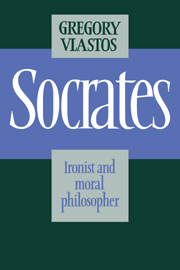Book contents
- Frontmatter
- Contents
- List of additional notes
- Introduction
- 1 Socratic irony
- 2 Socrates contra Socrates in Plato
- 3 The evidence of Aristotle and Xenophon
- 4 Elenchus and mathematics
- 5 Does Socrates cheat?
- 6 Socratic piety
- 7 Socrates' rejection of retaliation
- 8 Happiness and virtue in Socrates' moral theory
- Epilogue: Felix Socrates
- Additional notes
- Bibliography
- Index of passages cited
- Index of names in Plato and Xenophon
- Index of modern scholars
- Index of Greek words
7 - Socrates' rejection of retaliation
Published online by Cambridge University Press: 21 October 2009
- Frontmatter
- Contents
- List of additional notes
- Introduction
- 1 Socratic irony
- 2 Socrates contra Socrates in Plato
- 3 The evidence of Aristotle and Xenophon
- 4 Elenchus and mathematics
- 5 Does Socrates cheat?
- 6 Socratic piety
- 7 Socrates' rejection of retaliation
- 8 Happiness and virtue in Socrates' moral theory
- Epilogue: Felix Socrates
- Additional notes
- Bibliography
- Index of passages cited
- Index of names in Plato and Xenophon
- Index of modern scholars
- Index of Greek words
Summary
If therefore the light that is in thee be darkness, how great is that darkness.
(Matt. 6:23)In the last and most famous of his Theses on Feuerbach Marx observes: “The philosophers have done no more than interpret the world. The point, however, is to change it.” Substitute “morality” for “world” and the observation would be true of almost all the leading philosophers of the West. Moralists as powerfully innovative as are Aristotle, Hume, and Kant take the morality into which they are born for granted. The task they set themselves is only to excogitate its rationale. It does not occur to them to subject its content to critical scrutiny, prepared to question norms ensconced in it which do not measure up to their rational standards. But there have been exceptions, unnoticed by Marx, and of these Socrates is the greatest. Proceeding entirely from within the morality of his own time and place, he nevertheless finds reason to stigmatize as unjust one of its most venerable, best established, rules of justice.
By the morality of a society I understand those norms of right and wrong, rules of conduct or excellences of character, publicly acknowledged within it, whose function it is to foster human well-being. The sense of justice centers in the concern that those norms be applied impartially.
- Type
- Chapter
- Information
- SocratesIronist and Moral Philosopher, pp. 179 - 199Publisher: Cambridge University PressPrint publication year: 1991
- 5
- Cited by



